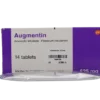Generic Augmentin Popular Offers
When it comes to treating bacterial infections, Augmentin stands out as one of the most trusted antibiotics on the market. Its powerful dual-action formula has proven effective against a wide range of bacteria, making it the go-to choice for both doctors and patients. At our online pharmacy, you can conveniently purchase Augmentin and have it delivered straight to your door, ensuring fast access to high-quality treatment at an affordable price.
What is Augmentin and How Does It Work?
Augmentin is a prescription antibiotic that combines two active ingredients: amoxicillin and clavulanic acid. Amoxicillin is a penicillin-based antibiotic that kills bacteria by interfering with their ability to build cell walls. Clavulanic acid, on the other hand, prevents certain bacteria from breaking down the amoxicillin, making the treatment more effective even against resistant strains. This combination allows Augmentin to combat a wide variety of infections, including respiratory tract infections, ear infections, urinary tract infections, and skin conditions caused by bacteria. Thanks to its unique formulation, Augmentin has become a reliable choice for patients who need fast and effective relief from bacterial illnesses.
Why Choose Augmentin for Your Treatment?
Augmentin offers several benefits that set it apart from other antibiotics. Its ability to target a broad spectrum of bacteria makes it an excellent choice for treating mixed infections and resistant bacterial strains. Furthermore, its dual-action formula ensures a higher success rate in fighting infections that might not respond to standard antibiotics. Patients often report noticeable improvements in their symptoms within just a few days of starting treatment. Whether you’re dealing with a stubborn respiratory infection or a persistent skin condition, Augmentin provides the comprehensive coverage you need for a quicker recovery.
Why Buy Augmentin From Us?
At our online pharmacy, we prioritize your health and satisfaction. All our products, including Augmentin, come directly from certified manufacturers, ensuring their authenticity and quality. We offer competitive prices, making it more affordable to access the medication you need. Our delivery options are designed to fit your schedule, with standard and express shipping available to ensure timely access to your treatment. Additionally, we are committed to safeguarding your privacy and protecting your personal data throughout the entire ordering process. Our dedicated customer support team is always ready to assist you with any questions or concerns, making your shopping experience seamless and secure.
How to Use Augmentin Safely and Effectively
It is essential to follow your doctor’s instructions when taking Augmentin to ensure its effectiveness and avoid potential side effects. The typical dosage for adults varies depending on the severity of the infection, with common regimens including 500 mg/125 mg every 8 hours or 875 mg/125 mg every 12 hours. For children, the dosage is calculated based on their weight and age, as determined by a healthcare professional. Augmentin is best taken at the start of a meal, as this helps to minimize stomach upset and improve absorption. Most treatment courses last between 5 to 10 days, but your doctor may recommend a different duration depending on your specific condition.
While Augmentin is generally well-tolerated, some patients may experience mild side effects such as nausea, diarrhea, or rash. These symptoms are usually temporary and resolve on their own. However, if you notice severe side effects or signs of an allergic reaction, such as difficulty breathing or swelling, seek immediate medical attention.
Frequently Asked Questions About Augmentin
Many customers wonder whether they need a prescription to purchase Augmentin. As with all antibiotics, a prescription is required to ensure the safe and proper use of the medication. This helps prevent misuse and reduces the risk of antibiotic resistance. Another common question concerns shipping times. We strive to provide fast and reliable delivery, with standard shipping typically taking 3–7 business days and express options available for faster service. Augmentin is also safe for children, provided the dosage is determined by a healthcare professional based on the child’s specific needs.
Order Augmentin Online in Just a Few Steps
Ordering Augmentin from our pharmacy is simple and straightforward. Start by selecting the appropriate dosage and quantity, then proceed to checkout where you’ll provide your shipping and payment details. Once your order is confirmed, we’ll process it promptly and ensure that your medication is delivered as quickly as possible. With our user-friendly platform and reliable service, buying Augmentin online has never been easier.
Clinical Evidence and Regulatory Approvals for Augmentin
Augmentin has been thoroughly studied and approved by leading health authorities in both the United States and Canada. Its effectiveness and safety have been validated through clinical trials and regulatory reviews. Below are key references to support the reliability of this trusted antibiotic:
United States (FDA-Approved Information)
The U.S. Food and Drug Administration (FDA) provides comprehensive prescribing information for Augmentin, covering its indications, recommended dosages, and clinical pharmacology. You can access the full prescribing document on the FDA website.
Additionally, clinical studies published in the Journal of the American Medical Association highlight the efficacy of amoxicillin/clavulanate in treating acute bacterial sinusitis. For detailed insights, review the findings on the JAMA website.
Canada (Health Canada-Regulated Information)
In Canada, Augmentin is regulated by Health Canada, ensuring its safety and efficacy for treating bacterial infections. Official drug registration details are available in the Health Canada Drug Product Database.
For general guidance on purchasing medications safely online and ensuring they meet Canadian standards, refer to Health Canada’s Choosing a Safe Online Pharmacy resource.
Clinical Research Supporting Augmentin
The combination of amoxicillin and clavulanic acid has been widely researched for its effectiveness in treating a broad spectrum of bacterial infections. A detailed review in Clinical Microbiology and Infection discusses its pharmacological properties and applications. Access the article here.
By referencing these authoritative sources, we ensure that our customers have access to transparent, evidence-based information, underscoring Augmentin’s reputation as a trusted treatment option for bacterial infections.



